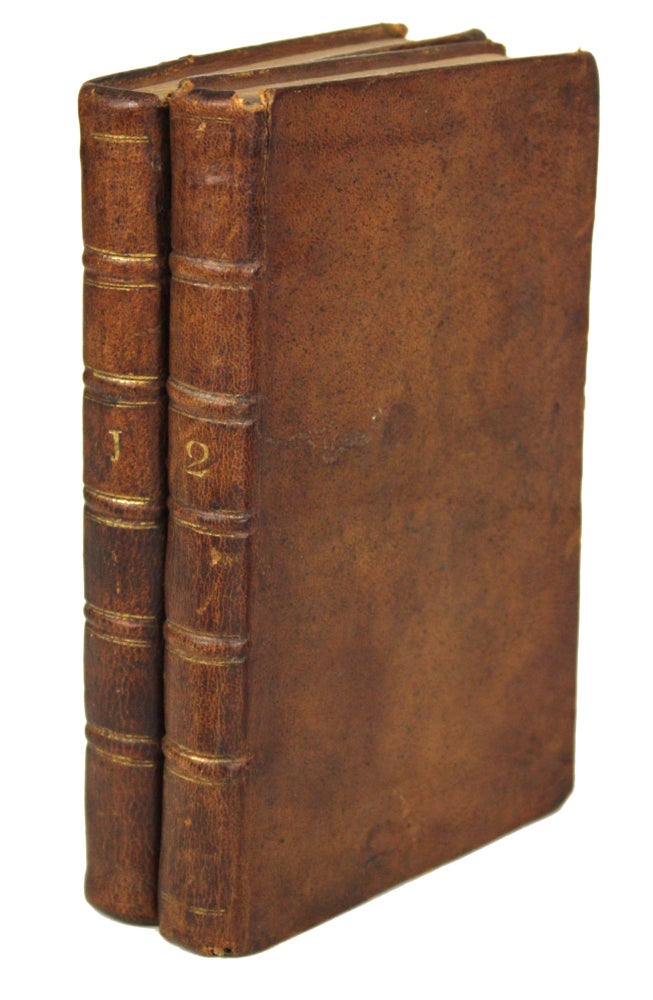MEMOIRS OF THE YEAR TWO THOUSAND FIVE HUNDRED ... Translated from the French, by W. Hooper, M.D. In Two Volumes. London: Printed for G. Robinson, in Pater-noster-Row, 1772. 12mo, two vo lumes: pp. [i-v] vi-viii [ix-x] [1] 2-224; [i-iv] [1] 2-248, eighteenth-century full speckled sheep, spine panels stamped in gold, gauffered edges. First edition in English. A translation of L'AN DEUX MILLE QUATRE CENT QUARANTE, first published in Amsterdam in 1771. "This first utopia set in future time was one of the eighteenth century's most successful books. It was immediately banned in France, put on the Inquisition's list of forbidden books in 1773, and condemned in Madrid in 1778 as a blasphemous work whose distributors, if discovered, would be fined five hundred ducats and sentenced to six years in prison. The Year 2440 had eleven editions in French between 1771 and 1799, as well as two English translations and translations into Dutch, Italian, and German. Investigation of its printing history leads Everett Wilkie to conclude that 'there were 18,000 copies in print in three languages by the end of 1772 and 30,000 copies by the end of 1782, at which point it had spread thoroughly over Europe ... 63,000 copies had been printed by Mercier's death' in 1814. The book was less successful across the Atlantic, but a 1795 Philadelphia edition was 'nevertheless, the first utopian novel published in North America.' George Washington and Thomas Jefferson owned copies of The Year 2440." - Alkon, Origins of Futuristic Fiction, p. 117. "The first account of an ideal society to be set in a real place (Paris) in the future, thus establishing the image as a goal to be attained rather than a mere standard for comparison. The reforms imagined by Mercier -- the extrapolation of Enlightenment ideals, including a keen appreciation of scientific and technical progress, guided by Rousseauesque Romanticism -- are instituted by a wise and benevolent king, but the book lent encouragement nevertheless to would-be revolutionaries. It was unlicensed by the government censors, and thus circulated illegally, but became a massive bestseller. Later editions were considerably augmented, mostly by the addition of new footnotes, which eventually expanded to greater length than the main text, making its construction very awkward; even so, it remains a landmark text." - Anatomy of Wonder (2004) II-757. "... although the earliest specimens of futuristic fiction were in English, the glory of discovering the true potentialities of the genre belongs to the French -- to Sébastien Mercier who established the first satisfactory model of the new fiction ... The utopian prophecy of L'AN 2440, the first influential story of the future in world literature, became one of the most widely read books in the last quarter of the eighteenth century. The translations into Dutch and German, the English and American editions, and the many imitations show how Mercier beguiled his readers in two continents with the vision of a dream come true." - Clarke, The Pattern of Expectation 1644-2001, p. 23. See Alkon, Origins of Futuristic Fiction, esp. pp. 117-29. Anatomy of Wonder (1976) 1-29; (1981) 1-123; (1987) 1-63; (1995) 1-63; and (2004) II-757. Bleiler, Science-Fiction: The Early Years 1476. Claeys (ed), Utopian Literature, pp. 10; 74; 138, Clarke, Tale of the Future (1978), p. 2. Fortunati and Trousson (eds), Dictionary of Literary Utopias, pp. 43-5. Howgego, Encyclopedia of Exploration: Invented and Apocryphal Narratives of Travel M35. Lewis, Utopian Literature, pp. 120-22. Negley, Utopian Literature: A Bibliography 772. Versins, Encyclopédie de l'Utopie, des Voyages Extraordinaires et de la Science Fiction, p. 582. Bleiler (1978), p. 138. Reginald 10017. Top section of upper joints cracking, a very good copy. An excellent copy of a major eighteenth-century utopian novel. (#170121).
Price: $3,500.00
No statement of printing.


